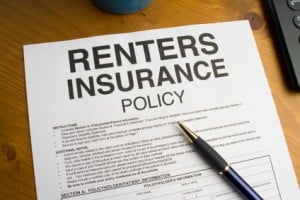THIS POST MAY CONTAIN AFFILIATE LINKS. PLEASE SEE MY DISCLOSURES FOR MORE INFORMATION

Table of Contents
Renter’s Insurance
From the tenant’s viewpoint, renter’s insurance protects their personal property in the event of a loss. For example, if the house were to burn down, the tenant would most likely lose their clothing, furniture, electronics, etc. All of these are considered personal property and are covered in a renter’s insurance policy. The cost for such a policy is low. Personally, I’ve had policies that cover $50,000 worth of goods and cost me less than $100 per month.
Homeowner’s Insurance
In most cases, the insurance policy that the landlord carries on their property includes coverage for only the structure itself and not the personal property in the house. So, if we use the same example of the house burning down, the landlord’s homeowner’s insurance would only cover the cost of rebuilding the house. It would not cover any of the contents inside the house. (Note that many landlords do have some personal property coverage built into their insurance policy, but this is to cover things such as replacement of the refrigerator or the washer and dryer.)
Liability Coverage
Many landlords are pushing and even requiring tenants to carry renter’s insurance. The reason for this is liability. Most renter’s policies cover liability coverage. For example, say I own a house and rent it to you and your friend comes over and slips and falls. If your friend sues for their medical payments to be covered, the renter’s insurance policy kicks in first before the landlord’s homeowner’s policy. The burden of liability is shifted from the landlord to the tenant.
This allows for the landlord to potentially get a lower premium for his homeowner’s policy. In theory, this lower premium keeps the rental price from rising. Lower fixed costs for the landlord means he can rent the house for less and still make a profit. Of course, this is all in theory.
Many insurance companies are the one’s pushing landlords to require tenants to have renter’s insurance. As of this writing there is nothing stopping a landlord from requiring this from a potential tenant.
Why You Want Renter’s Insurance
As a tenant, you want renter’s insurance. Not because of the liability issue, but for the peace of mind knowing that your personal property is protected. If you live in an apartment complex, there is no telling who your neighbors are letting into the building. Knowing that your belongings are protected should something bad happen will allow you to sleep at night.
Final Thots
Understanding your insurance coverage as well as the landlords is imperative. Don’t just assume that the landlord has coverage that will protect you and your belongings. In many cases, they do not. By spending the few extra dollars each month to protect yourself will save you many potential headaches down the road. Just be sure to compare prices every year or so to make sure you are getting the best deal.
